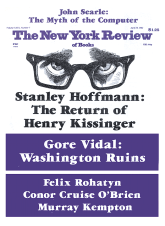The public enlightenment about El Salvador would be signally served by the current issue of Dissent if the enlightenment afforded by an organ with a circulation of less than 6,500 could realistically be called public. Dissent commissioned Gabriel Zaid, a Mexican social critic, to provide a roster of the teams and players in this dreadful game. He has responded with one of those dense and intimate studies of confusion whose blending of the cynical with the morally concerned guides us as close as we can come to an understanding of affairs like this, which is that they cannot be understood by persons who look for a right side and a wrong one.
Few people will read Zaid and fewer still will attend his message. It is our national disease, afflicting liberals and conservatives alike, to be unable to leave a bad situation alone. Zaid is savage with all parties except possibly President José Napoleón Duarte; and, even in this case, he does not reveal his sympathy so much as suggest it by withholding what is otherwise a general scorn.
Like most decent persons in revolutionary crises of the hopeless variety, Duarte is, for the moment, tolerated and protected by terrorists of the right and threatened by terrorists of the left. That situation is hardly promising for any moderate’s survival; and if Duarte does not survive, our State Department will likely throw in with the terrorists of the right, and we Americans proud of our commitment to social justice will cheer on the terrorists of the left.
And yet, by Zaid’s account, this is only another of those struggles between two sets of the privileged while the deprived hide in their shacks whenever the army comes to protect or the guerrillas to liberate them. This fight is not even about communism, if that word can be said to have any meaning left. One of the ironies of El Salvador’s blood enemies is that they have been comrades before and, now and then, become comrades again. Just ten years ago, El Salvador’s Communist Party was running Duarte for president and Guillermo Manuel Ungo, now in Mexico backing the insurgents, for vice president.
But then Latin America’s official communists are generally worn out and, like most old stagers in politics, devoted to the electoral process for its patronage. The guerrillas seem, for the most part, to be led by young men who bolted the party for madder music and stronger wine.
A year or so ago, Zaid notices, more than 25,000 people in Mexico City marched in support of the revolution in El Salvador.
The Salvadoran opposition is capable of putting six times as many Mexicans on their feet to protest in the streets as Salvadorans to wage war at home.
It is always thus. The Mexican government’s abuse of the poor makes our own government look like the Russell Sage Foundation; and yet its leaders are delighted with any uprising on behalf of the landless that occurs within any borders that do not touch their own.
The only passion these contending factions share is for the pure pleasure of terror. When one side can’t find the other it contents itself with letting the blood of one of its own. Zaid cites the boasts of revolutionary triumphs. They include the dynamiting of a Social Security office. “What’s the use,” he asks, “of destroying…Social Security offices? It proves that the government can’t put down the guerrillas. But it also earns the hatred of numerous sick people.”
And here we are talking as though this were a problem of politics, when it is mainly about murder as an end in itself. We supply arms to a government and other countries supply arms to a rebel force, and the major employment both factions have for their weapons is to shoot bystanders. Call it left or call it right. It makes little difference. The world is run by people obsessed with the notion that power begins at the barrel of a gun. And woe, as usual, to the powerless. Zaid writes that the “true question for now is how to get those who believe in violence out of the picture.” He would send a good part of the army out of the country—“even…give them money to make it possible.” Then “a pact could be sought with the political opposition, disconnecting it from the armed opposition.” The election of March 28 gives little promise that anything of the sort will happen.
—March 30
This Issue
April 29, 1982



